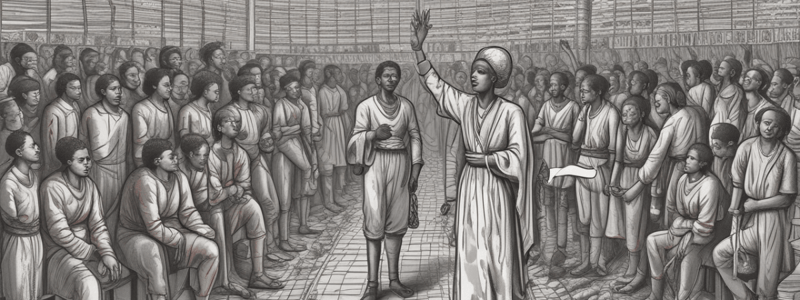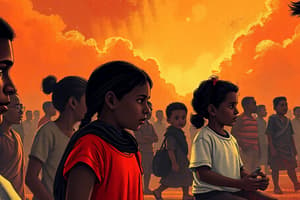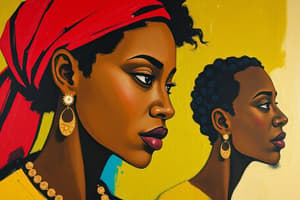Podcast
Questions and Answers
What is the primary characteristic of chattel slavery?
What is the primary characteristic of chattel slavery?
- Forced labor to repay debt or other obligations
- Women and girls forced into marriage and servitude
- People treated as personal property, bought, sold, and inherited (correct)
- Work extracted from people under threat of penalty or punishment
Which region had internal slavery that existed in various kingdoms and empires?
Which region had internal slavery that existed in various kingdoms and empires?
- Asia
- Africa (correct)
- The Americas
- Ancient Greece and Rome
What was the primary purpose of the transatlantic slave trade?
What was the primary purpose of the transatlantic slave trade?
- To spread Christianity to the Americas
- To forcibly enslave millions of Africans and transport them to the Americas (correct)
- To establish trade relationships between Africa and the Americas
- To establish colonies in Africa
Who were the leaders of the 18th-19th century abolition movements?
Who were the leaders of the 18th-19th century abolition movements?
What was the result of the Emancipation Proclamations in the US and UK?
What was the result of the Emancipation Proclamations in the US and UK?
What type of slavery involves forced labor to repay debt or other obligations?
What type of slavery involves forced labor to repay debt or other obligations?
Flashcards are hidden until you start studying
Study Notes
Definition and History
- Slavery: a system where people are treated as property, forced to work, and are denied basic rights and freedoms.
- Existence dates back to ancient civilizations, including Greece, Rome, and Africa.
- Transatlantic Slave Trade (15th-19th centuries): millions of Africans forcibly enslaved and transported to the Americas.
Types of Slavery
- Chattel slavery: people treated as personal property, bought, sold, and inherited.
- Debt bondage: forced labor to repay debt or other obligations.
- Forced labor: work extracted from people under threat of penalty or punishment.
- Bride price slavery: women and girls forced into marriage and servitude.
Slavery in Different Regions
- Ancient Greece and Rome: widespread use of slaves in households, agriculture, and mining.
- Africa: internal slavery existed in various kingdoms and empires, with transatlantic trade devastating the continent.
- Americas: European colonizers brought millions of enslaved Africans to work on plantations and in mines.
- Asia: various forms of slavery existed in ancient and medieval periods, including debt bondage.
Abolition and Legacy
- Abolition movements: 18th-19th century campaigns to end slavery, led by activists like William Wilberforce and Frederick Douglass.
- Emancipation Proclamations: 1863 (US) and 1833 (UK) declarations freeing slaves, but often with limited implementation.
- Modern-day slavery: estimated 40 million people trapped in modern forms of slavery, including forced labor, debt bondage, and sex trafficking.
- Reparations and recognition: ongoing debates and efforts to acknowledge and redress the historical injustices of slavery.
Studying That Suits You
Use AI to generate personalized quizzes and flashcards to suit your learning preferences.




